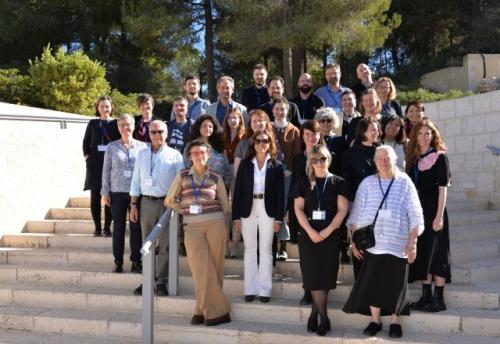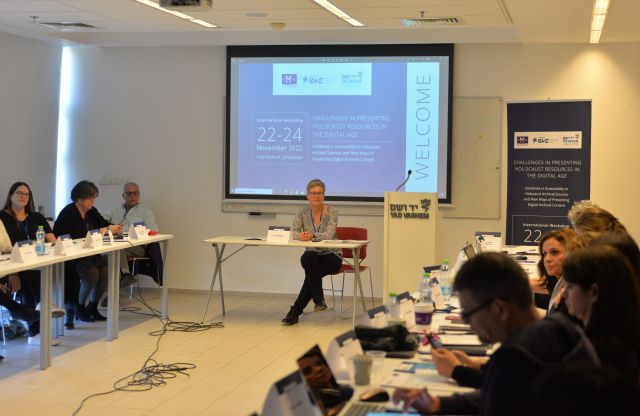Report on EHRI Workshop | Challenges in Presenting Holocaust Resources in the Digital Age | From Instagram to Holograms

On 22-24 November 2022, over 40 experts from Germany, Austria, the Netherlands, Italy, Greece, Ukraine, Poland, Czechia, Hungary, UK, USA, and Israel gathered at Yad Vashem in Jerusalem to participate in the international workshop “Challenges in Presenting Holocaust Resources in the Digital Age: Initiatives in Accessibility to Holocaust Archival Sources and New Ways of Presenting Digital Archival Content". The workshop was organized within the framework of the EHRI project, together with the Foundation “Remembrance, Responsibility and Future” (EVZ).
Conflicting views
Collecting sources from the Holocaust period is the basis for research, education and commemoration. In the digital age, open, online access to this material has a key role in facilitating these activities. The gap between the amount of archival documentation amassed by Holocaust collection holding institutions and the rate at which this material is made available online has engendered conflicting views regarding the degree of information necessary for presenting the documentation in the proper context, i.e. extensive metadata vs. just getting the material out there with minimal descriptions and information.
New tools, platforms and resources
At the same time, the demand for online access has spurred the creation of innovative, new tools, platforms and resources for presenting digital archival content. These may take the form of traditional online archives with expanded search capabilities, including cross-database links, data visualization and more. Other initiatives encompass platforms that allow the user to contextualize, interpret and visualize Holocaust sources.
A platform for showcasing
 The workshop provided a platform for showcasing such initiatives, and an opportunity for discussing challenges and dilemmas in online accessibility and presentation of Holocaust archival sources.
The workshop provided a platform for showcasing such initiatives, and an opportunity for discussing challenges and dilemmas in online accessibility and presentation of Holocaust archival sources.
Several participants demonstrated innovatory methods and tools for providing access to new online databases and for cross-linking databases from two (or more) institutions in order to better serve research of scattered Holocaust related data. A number of the initiatives presented involve the incorporation and use of archival sources in geo-mapping and virtual reality projects, and digitally-guided physical tours of Holocaust period sites. Additional presentations addressed curatorial methods of presenting Holocaust sources and items through online and virtual exhibitions, and the integration of many micro-history collections into one online resource.
Oral testimony-based applied game
In a session on new approaches to online Holocaust survivor testimonies, participants were presented with the power and limitations of an oral testimony-based applied game, created through the collaboration between a survivor testimony collecting organization and a game development firm.
Holocaust education
An additional focus of the workshop was the use of digital archival sources in Holocaust education. Educators presented the use of a wide array of easily available open-source tools for engaging students with Holocaust archival sources and history, at both the university and middle/high school levels.
Ari Folman’s animated film “Where is Anne Frank”
All participants agreed that one of the workshop’s highlights was the screening of Ari Folman’s animated film “Where is Anne Frank”, followed by a discussion with the award-winning director and screenwriter. The discussion touched on social media platforms, which provided a fitting segue to the final session on the ethical boundaries in the use of innovative technology (e.g. holograms of survivors, Instagram stories, etc.), as well as dilemmas in the presentation of archival content online (lack of descriptions, languages, context).
Read more in these articles from workshop participants:
Mapping the Archive: The Wiener Holocaust Library’s Refugee Map
Education | The Remediation of the Holocaust Narratives in the History Classroom
CLARIN Project | Voices from Ravensbrück: The Value of Multilingual Oral History
